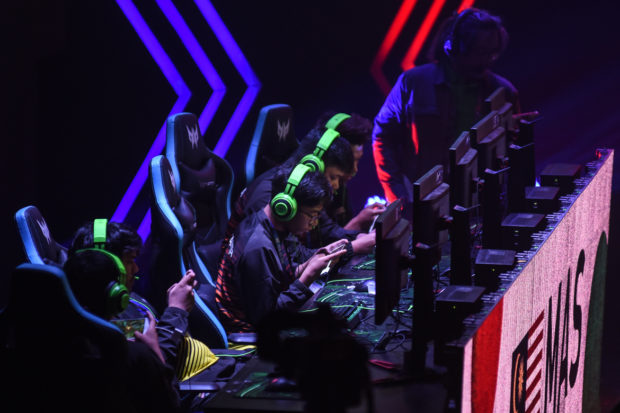
Esports first gained wide mainstream media treatment during the 2019 Southeast Asian
Games. —JAM STA. ROSA
A few years ago, gamers were largely cast in an unflattering light—mainstream culture viewed them as bums even. So it seemed that building a community where gamers would be respected and accepted was a total fantasy.
But with 400 million gamers thriving in the region, the rise of esports in legitimate competition arenas and the rapid growth of technology, that changed quickly.
Esports as a medal event in the 30th Southeast Asian Games held in the Philippines last year was a huge win for gaming. Sure, it may have glorified parental horror, but there was a massive shift away from old stereotypes.
And PVP Esports, a platform created by Singapore Telecommunications (Singtel) back in 2018, wants to help fuel that shift by creating a community within the Southeast Asian region.
The group wants to make this an Asean effort, instead of relying on individual countries to oversee the growth of esports within their respective borders.“It’s no longer just [a] singular vision. This is about building that community and in fact Southeast Asia needs to unite as a region and not just singular countries to make it work,” said Cindy Tan, marketing head of Singtel International Group.
Acknowledging that it is a community that cannot be built overnight, Tan said at the sidelines of the Thailand Game Expo in Bangkok, that they are already planting the seeds.
“That’s the main five-year vision and how do we get there? I think to get there we have to work with our partners,” said Arthur Lang, CEO of Singtel International Group.
“All we want to do is just give them the canvass; we give them a blank sheet of paper and let them go paint,” Lang said. PVP Esports’ partners will create content that can capture new audiences to be part of the community and at the same time keep current customers engaged.
“We want to show a different perspective of gaming. We want to show that gaming can be very serious and not just a hobby or pastime,” Lang said.
“It can actually be a career. And I think that’s something most people still do not really know,” he added.
Not a nuisance
But for the community to be successful it needs to tackle the tug-of-war between the sport and the parents.
And to get parents to look beyond gaming as a nuisance activity that gets in the way of school, the group partnered with different tertiary institutions for a campus league last year.PVP Esports introduced amateur esports leagues for the gaming community: The PVP Corporate League for working professionals across the region and the PVP Inter-campus League for tertiary students in Singapore.
Together they drew 2,000 gamers from across Southeast Asia and 1.4 million online views. Over 50,000 people attended the regional grand finals held at Singapore Comic Con last December and a Philippine team actually ruled the corporate league Mobile Legends: Bang Bang event.
PVP Esports brought event organizers to teach schools how to groom their esports labs, how to write stories, what “shoutcasting” is, and other gaming subcultures.
“So through that they also got to realize all the intricacies of esports; the other parts of esports be it as a hobby, as a passion, as just [a] personal learning even to the extent of a career in the future,” Tan said.
A key victory for the group was when Singapore’s minister of education graced the PVP Esports event because he recognized the youth’s passion for gaming.
And “passion is something you cannot deny, right?” Tan added.
And PVP Esports is looking beyond a passion for mere products.
“At the end of the day products can be easily copied especially in the digital world; it can happen in a snap,” Lang said.
That’s why PVP Esports is heavy on community building, focusing on giving its community mainstream platforms to showcase their skills. It had its second run of its rebranded community leagues, which was launched on Jan. 31 at the Thailand Game Expo in Bangkok. The campus league, now called PVP Esports Campus Championship, for tertiary students is now a regional event like its corporate counterpart, now called PVP Esports Corporate Championship.
The 2020 community leagues will run from March to June and August to November where the top teams from Singapore, Indonesia, Thailand and the Philippines will play over a total jackpot prize of over P5 million.
Globe will host the local qualifiers for the Philippines, where gamers will battle it out to reach the Indonesia Games Championship in July.
The goal is to amplify the visibility of gamers until the day comes when people will forget that the old stereotypes existed in the first place.

